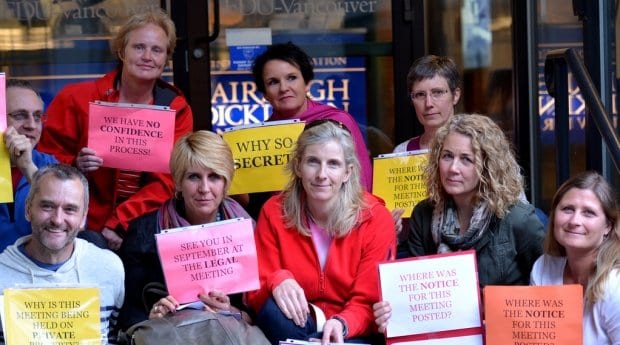A queue of parents crowded into the hallway of a small international college in downtown Vancouver June 17 only to be turned away from a meeting of their own parent advisory council (PAC).
The meeting follows the Vancouver School Board’s June 16 adoption of revisions to its anti-homophobia policy to better protect trans students.
Cheryl Chang, the chair of Lord Byng Secondary’s PAC, told all parents who were not on an executive list that they would be barred from the meeting. Once inside, Chang and a slate of her candidates were elected to another term in PAC leadership.
Chang had used her authority as PAC chair in April to write an open letter calling for a halt to new school board rules to protect trans students.
The Vancouver School Board’s policy revisions address trans issues in school, such as gender-segregated washrooms and the use of preferred pronouns. In her letter, Chang wrote that the policy would be “using our children in some sort of social experiment that could have long-term negative repercussions.”
In May, PAC parents who disagreed with Chang’s position voted to repeal the letter in an angry, fractious meeting at which hecklers shouted at one transgender student who tried to speak. At the same meeting, Chang passed around a sign-up sheet for parents interested in joining the PAC’s new executive. Many did not realize that without signing up, they would be unable to attend the next meeting.
In the weeks leading up to the June 17 meeting, parents learned that only those on the list would be allowed to vote for new executive officers. When some tried to add their names to the list, they were turned down. Chang arranged the meeting in a private college downtown, far from Lord Byng’s catchment area in the West Side, and told other parents that anyone other than the 61 on the executive list was barred from attending.
Chang tells Xtra that signing up on a list was the only requirement for becoming an executive and that the PAC rules barred her from allowing others to join. Maureen Fitzgerald, a lawyer and parent at Byng, disagrees.
Fitzgerald drew up a long list of procedural complaints against Chang, including failure to properly notify parents or properly elect an executive. “I find this extremely disturbing,” she says. “This is not normal in any stretch. This is crazy.”
“It was an executive meeting, and it was not intended for other people to attend,” Chang says. “We just didn’t have room for it.”
In an email exchange shared with Xtra, Fitzgerald asks Chang what law could prevent her from attending the meeting.
“There are laws about trespassing on private property,” Chang replies.
“Are you saying that I will be arrested if I try to attend the Executive Meeting tomorrow night?” Fitzgerald asks.
“I’m saying you won’t be admitted to the meeting. You asked what law would prevent you from doing so,” Chang answers.
Chang, also a lawyer and parent, has campaigned against the transgender policy from the start, saying it restricts parents’ rights and is medically unsound. She was also an advocate for the Anglican Network, a conservative group that broke from the Canadian Anglican church over gay marriage.
Chang says that her words have been twisted to make it sound like she is against trans students or the LGBT community and that other parents have politicized the process.
At the June 17 meeting, parents who were on the list were ushered inside. A dozen parents who showed up despite not being on the list were turned away by district PAC chair John Puddifoot. “There are some unhappy people here because they want what they want,” he said in response to media questions.
Xtra’s reporter, along with unregistered parents, was not allowed into the meeting. Afterward, three parents who were on the executive list said that the meeting was rushed and that Chang told attendees there was no real need for speeches since everyone already knew how they were going to vote. Chang agrees she did say “something to that effect.”
“There was very little exchange of ideas,” says Julie O’Dwyer, the parent of a trans former student at Byng.
“It was clearly not a democratic process,” said another parent, Mary Pappajohn. “It seemed farcical in many ways.”
The crowded classroom, O’Dwyer says, quickly divided into two camps: those in support of Chang in the front and those against in the back. The dissenters tried to introduce agenda items to call for an apology from the executive and to postpone the meeting, both of which were defeated.
Chang was reelected as chair by a vote of 36 to 17, along with the executive candidates she supported.
The one thing both Chang and her detractors can agree on is the need to heal the political divide between parents.
“We’re trying to depoliticize the PAC,” says Lorrie Miller, one of the dissenters. “They’re supposed to be a vehicle of communication between schools and families. That’s obviously broken down.”
“I would like to see us get back to the regular business of PAC and get the politics out of the school,” Chang agrees. “There’s no reason why politics should have been brought into the school.”


 Why you can trust Xtra
Why you can trust Xtra


